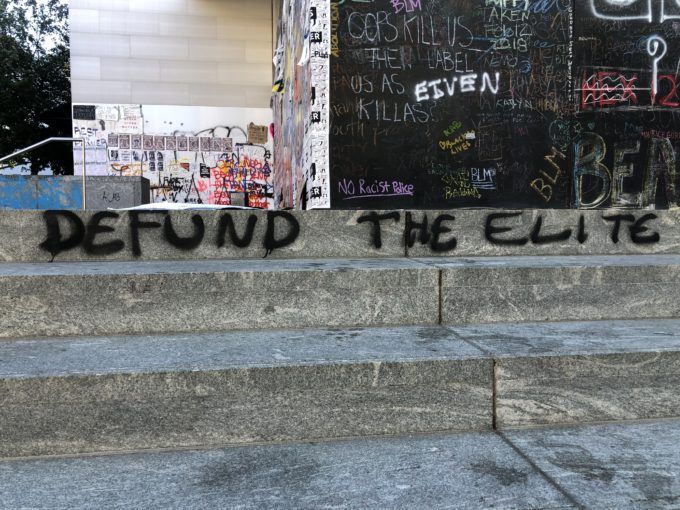A massive infusion of new tax revenue along these lines would significantly bolster our world’s capacity to address the continuing challenges of poverty and climate change. That same revenue would significantly enhance the political health of our world’s democracies as well.
Progressive taxes, Zucman’s report stresses, remain “a key pillar of democratic societies.” Having tax systems that recognize that the rich have the wherewithal to pay taxes at a higher rate than people of limited means “strengthens social cohesion and trust in governments to work for the common good.”
Modern societies have typically aimed to do that strengthening via income taxes. But income taxes have had little success collecting appreciable revenue from our ultra-rich, Zucman relates, mainly because “ultra-high-net-worth individuals derive their income not from the wages they earn, but from the wealth they own — more precisely, in most cases from the businesses they own.”
These rich can use the corporations they control to end run their personal income taxes. One example: The less their companies shell out in dividends, the higher their corporate share price rises. And by not selling their own personal shares, the rich can sidestep capital gains taxes. Some of our planet’s largest publicly traded corporations — think corporate giants that range from Amazon and Tesla to Alphabet and Meta — pay only token dividends if they pay dividends at all.
These sorts of tax-avoiding maneuvers have enabled our world’s richest 0.0001 percent — our billionaire class — to more than quadruple their wealth as a fraction of global gross domestic product since the 1980s. This enormous addition to the wealth of our richest has for the most part totally escaped taxation.
Under the global 2 percent minimum tax that Zucman is advancing, that picture would change. All billionaires would find themselves facing this minimum tax if the “individual income taxes, wealth taxes, and economically equivalent levies” they pay add up to less than 2 percent of their overall wealth.
Could billionaires weasel their way out of paying this global minimum tax? Could they hide significant pieces of their personal fortunes? Not likely. The market value of each billionaire’s assets would take no great sleuthing to establish since the bulk of billionaire wealth comes from the value of the corporate shares of stock they hold, a matter of public record.
And most nations, Zucman adds, have also developed methods to value other sources of billionaire wealth because they’re already levying either inheritance or estate taxes.
Zucman’s minimum billionaire tax would let each participating nation determine how to make its billionaires meet the 2 percent minimum tax standard. Nations could, for instance, define unrealized capital gains as income, as the Biden administration has proposed, or put a wealth tax in place. A 2 percent tax on a billionaire’s personal wealth, Zucman points out, would “by definition” meet an international 2 percent minimum tax standard.
Nations could also simply presume that ultra-high-net-worth individuals “earn a certain fraction of their wealth in income” and place a tax on that presumed income.
Allowing nations flexibility in how they enforce a global billionaire tax minimum, Zucman explains, would let each country “choose the instrument that best fits its circumstances, its legal context, its fiscal tradition, and its existing information reporting system.” And this flexible approach would likely “maximize the number of countries that could join the common standard.”
Serious obstacles to subjecting billionaires to a global minimum tax, Zucman’s report concedes, certainly do exist, on both technical and political levels.
“A variety of political and geopolitical factors,” he observes, “could make it difficult to obtain truly global participation in the proposed common standard.”
But the already existing minimum tax on multinational corporations, now three years old, vividly illustrates how global cooperation can overcome even the most serious of obstacles. The new corporate minimum tax allows “participating countries to tax non-participating countries’ undertaxed multinationals.” A coordinated global minimum tax on billionaires could adopt that same approach.
Zucman’s proposal for a global minimum tax on the world’s super rich, the economic ministers of Brazil and Spain stressed earlier this month, is already gaining significant international momentum. At a news conference in Rome, these two ministers called higher taxes on the world’s wealthiest an absolute must in a world confronting challenges that range from hunger and climate change to the horrific debt burden that’s currently confronting low-income countries.
A global minimum tax on billionaires, Brazil’s Fernando Haddad declared, would “affect just a few thousand individuals while benefiting billions.” Haddad went on to label a global billionaire minimum tax “a reasonable proposal in terms of social, economic, and political justice.”
Zucman, for his part, seems equally optimistic on his proposal’s prospects.
“New forms of international cooperation, long deemed utopian,” as he observes in his landmark new report, “can emerge in a relatively short period of time.”

